Bachelor Nursing Assignment: Critical Appraisal of Cancer Experience
VerifiedAdded on 2021/05/31
|9
|2297
|212
Essay
AI Summary
This Bachelor of Nursing assignment critically appraises three research articles exploring the lived experiences of individuals with cancer. The assignment begins with an introduction highlighting the increasing prevalence of cancer and its associated physical and mental health impacts, setting the stage for understanding the importance of patient-centered care. The search strategy used Google Scholar, PubMed, and Medline to identify relevant research published between 2010 and 2018. The assignment then critically evaluates three key studies: Leal et al. (2015), which used a qualitative approach to examine patients' ongoing experiences; Sheilds et al. (2015), which employed a narrative inquiry to explore stories of people with life-threatening illnesses; and Li et al. (2015), which focused on the experiences of Chinese couples living with cancer. The findings reveal both positive and negative aspects of living with cancer, including emotional turmoil, the balance between living and awareness of death, and the impact on relationships. The discussion synthesizes the findings, highlighting similarities and contrasts across the studies. Finally, the assignment reflects on the application of these research findings to nursing practice, emphasizing the need for nurses to understand the emotional needs of cancer patients and develop communication skills to provide patient-sensitive care. The assignment concludes by stressing the importance of supporting psychological well-being and building resilience in patients.
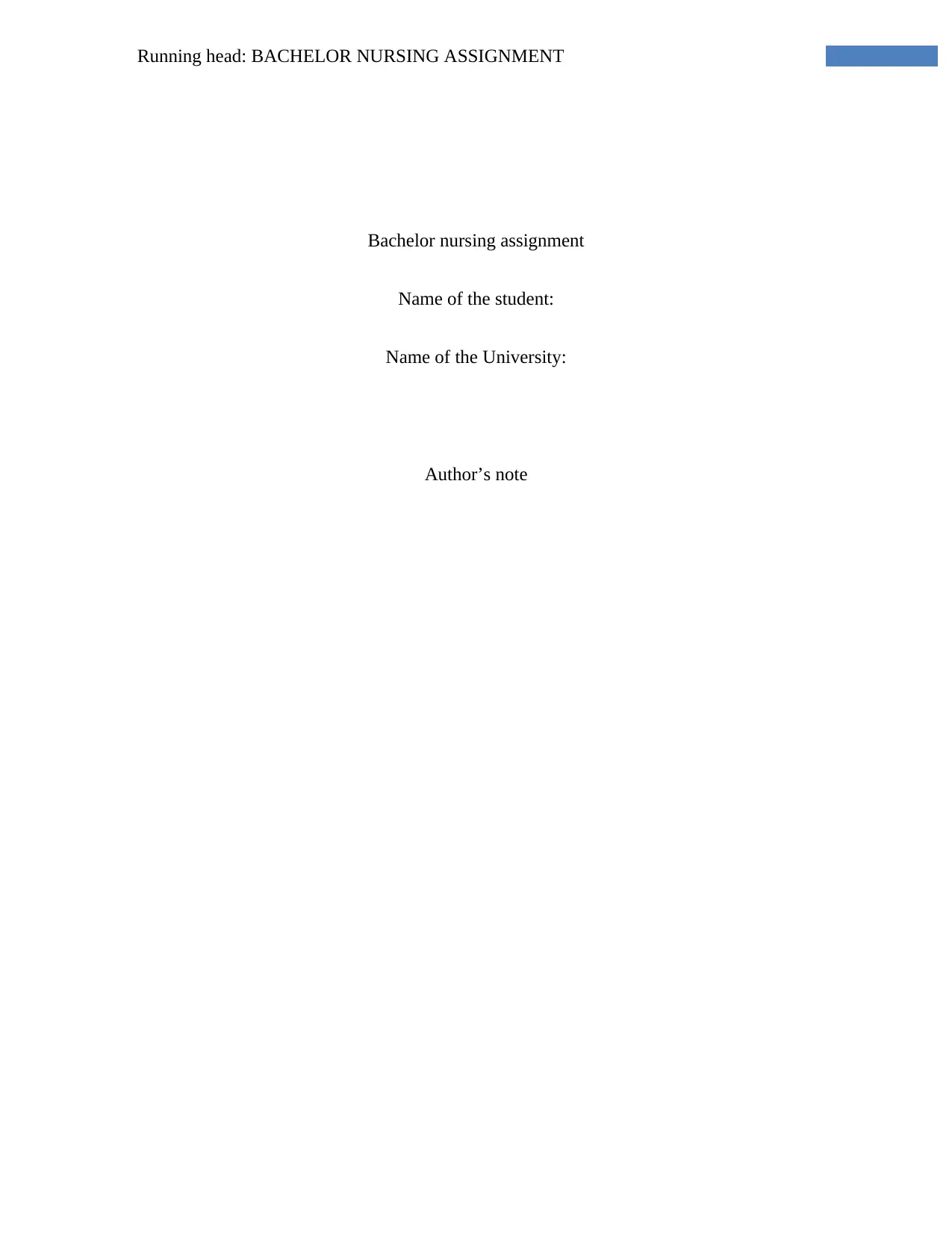
Running head: BACHELOR NURSING ASSIGNMENT
Bachelor nursing assignment
Name of the student:
Name of the University:
Author’s note
Bachelor nursing assignment
Name of the student:
Name of the University:
Author’s note
Paraphrase This Document
Need a fresh take? Get an instant paraphrase of this document with our AI Paraphraser
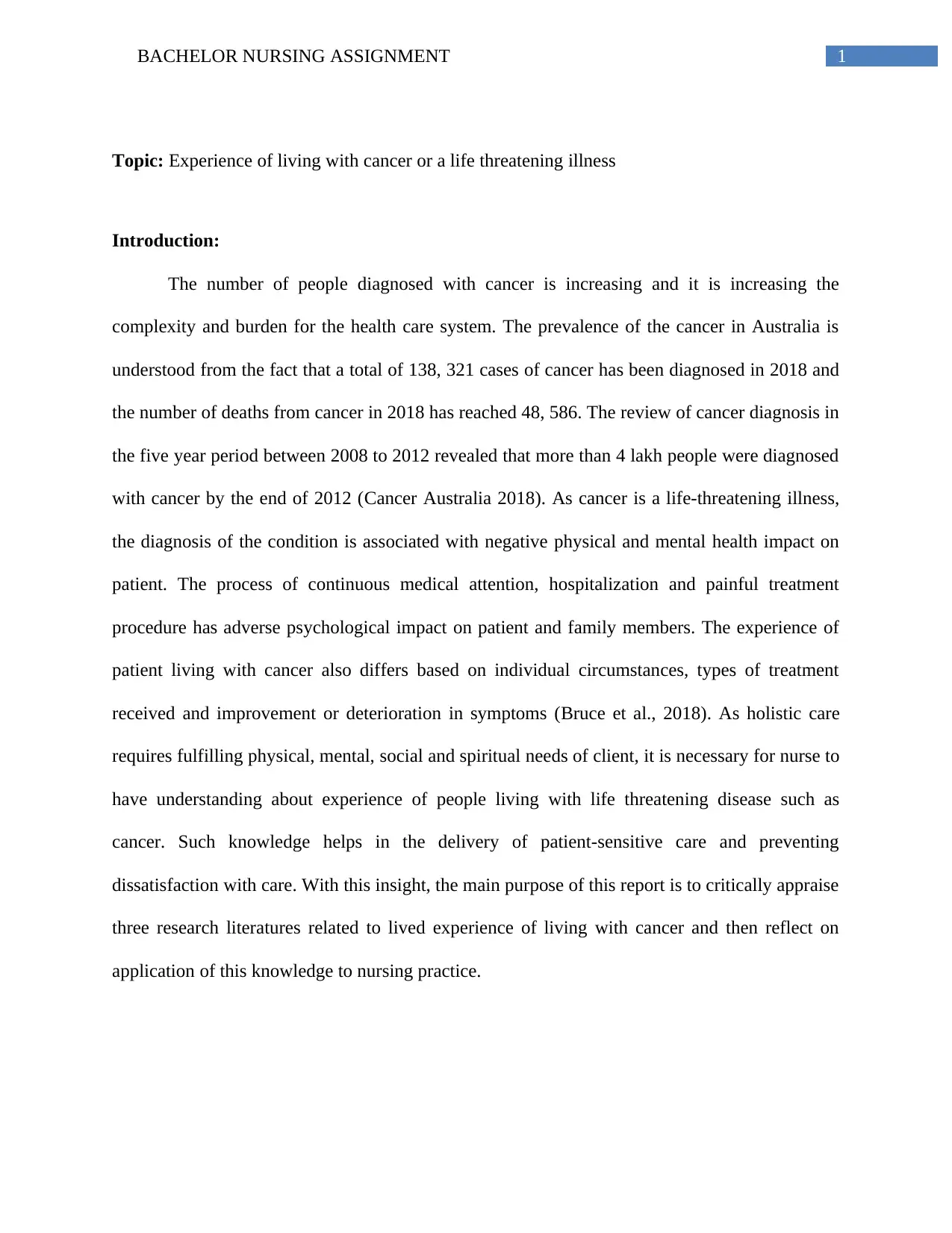
1BACHELOR NURSING ASSIGNMENT
Topic: Experience of living with cancer or a life threatening illness
Introduction:
The number of people diagnosed with cancer is increasing and it is increasing the
complexity and burden for the health care system. The prevalence of the cancer in Australia is
understood from the fact that a total of 138, 321 cases of cancer has been diagnosed in 2018 and
the number of deaths from cancer in 2018 has reached 48, 586. The review of cancer diagnosis in
the five year period between 2008 to 2012 revealed that more than 4 lakh people were diagnosed
with cancer by the end of 2012 (Cancer Australia 2018). As cancer is a life-threatening illness,
the diagnosis of the condition is associated with negative physical and mental health impact on
patient. The process of continuous medical attention, hospitalization and painful treatment
procedure has adverse psychological impact on patient and family members. The experience of
patient living with cancer also differs based on individual circumstances, types of treatment
received and improvement or deterioration in symptoms (Bruce et al., 2018). As holistic care
requires fulfilling physical, mental, social and spiritual needs of client, it is necessary for nurse to
have understanding about experience of people living with life threatening disease such as
cancer. Such knowledge helps in the delivery of patient-sensitive care and preventing
dissatisfaction with care. With this insight, the main purpose of this report is to critically appraise
three research literatures related to lived experience of living with cancer and then reflect on
application of this knowledge to nursing practice.
Topic: Experience of living with cancer or a life threatening illness
Introduction:
The number of people diagnosed with cancer is increasing and it is increasing the
complexity and burden for the health care system. The prevalence of the cancer in Australia is
understood from the fact that a total of 138, 321 cases of cancer has been diagnosed in 2018 and
the number of deaths from cancer in 2018 has reached 48, 586. The review of cancer diagnosis in
the five year period between 2008 to 2012 revealed that more than 4 lakh people were diagnosed
with cancer by the end of 2012 (Cancer Australia 2018). As cancer is a life-threatening illness,
the diagnosis of the condition is associated with negative physical and mental health impact on
patient. The process of continuous medical attention, hospitalization and painful treatment
procedure has adverse psychological impact on patient and family members. The experience of
patient living with cancer also differs based on individual circumstances, types of treatment
received and improvement or deterioration in symptoms (Bruce et al., 2018). As holistic care
requires fulfilling physical, mental, social and spiritual needs of client, it is necessary for nurse to
have understanding about experience of people living with life threatening disease such as
cancer. Such knowledge helps in the delivery of patient-sensitive care and preventing
dissatisfaction with care. With this insight, the main purpose of this report is to critically appraise
three research literatures related to lived experience of living with cancer and then reflect on
application of this knowledge to nursing practice.
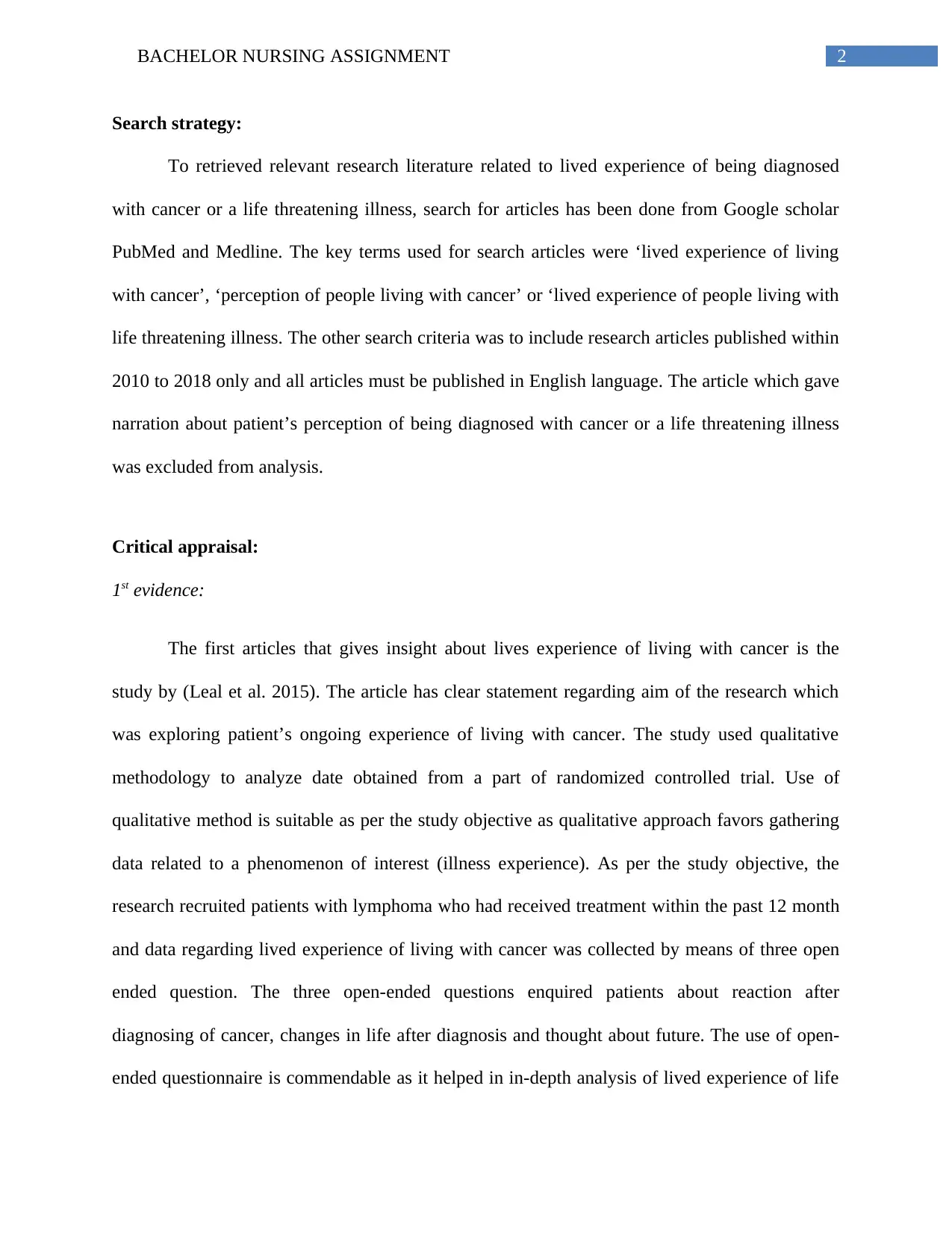
2BACHELOR NURSING ASSIGNMENT
Search strategy:
To retrieved relevant research literature related to lived experience of being diagnosed
with cancer or a life threatening illness, search for articles has been done from Google scholar
PubMed and Medline. The key terms used for search articles were ‘lived experience of living
with cancer’, ‘perception of people living with cancer’ or ‘lived experience of people living with
life threatening illness. The other search criteria was to include research articles published within
2010 to 2018 only and all articles must be published in English language. The article which gave
narration about patient’s perception of being diagnosed with cancer or a life threatening illness
was excluded from analysis.
Critical appraisal:
1st evidence:
The first articles that gives insight about lives experience of living with cancer is the
study by (Leal et al. 2015). The article has clear statement regarding aim of the research which
was exploring patient’s ongoing experience of living with cancer. The study used qualitative
methodology to analyze date obtained from a part of randomized controlled trial. Use of
qualitative method is suitable as per the study objective as qualitative approach favors gathering
data related to a phenomenon of interest (illness experience). As per the study objective, the
research recruited patients with lymphoma who had received treatment within the past 12 month
and data regarding lived experience of living with cancer was collected by means of three open
ended question. The three open-ended questions enquired patients about reaction after
diagnosing of cancer, changes in life after diagnosis and thought about future. The use of open-
ended questionnaire is commendable as it helped in in-depth analysis of lived experience of life
Search strategy:
To retrieved relevant research literature related to lived experience of being diagnosed
with cancer or a life threatening illness, search for articles has been done from Google scholar
PubMed and Medline. The key terms used for search articles were ‘lived experience of living
with cancer’, ‘perception of people living with cancer’ or ‘lived experience of people living with
life threatening illness. The other search criteria was to include research articles published within
2010 to 2018 only and all articles must be published in English language. The article which gave
narration about patient’s perception of being diagnosed with cancer or a life threatening illness
was excluded from analysis.
Critical appraisal:
1st evidence:
The first articles that gives insight about lives experience of living with cancer is the
study by (Leal et al. 2015). The article has clear statement regarding aim of the research which
was exploring patient’s ongoing experience of living with cancer. The study used qualitative
methodology to analyze date obtained from a part of randomized controlled trial. Use of
qualitative method is suitable as per the study objective as qualitative approach favors gathering
data related to a phenomenon of interest (illness experience). As per the study objective, the
research recruited patients with lymphoma who had received treatment within the past 12 month
and data regarding lived experience of living with cancer was collected by means of three open
ended question. The three open-ended questions enquired patients about reaction after
diagnosing of cancer, changes in life after diagnosis and thought about future. The use of open-
ended questionnaire is commendable as it helped in in-depth analysis of lived experience of life
⊘ This is a preview!⊘
Do you want full access?
Subscribe today to unlock all pages.

Trusted by 1+ million students worldwide
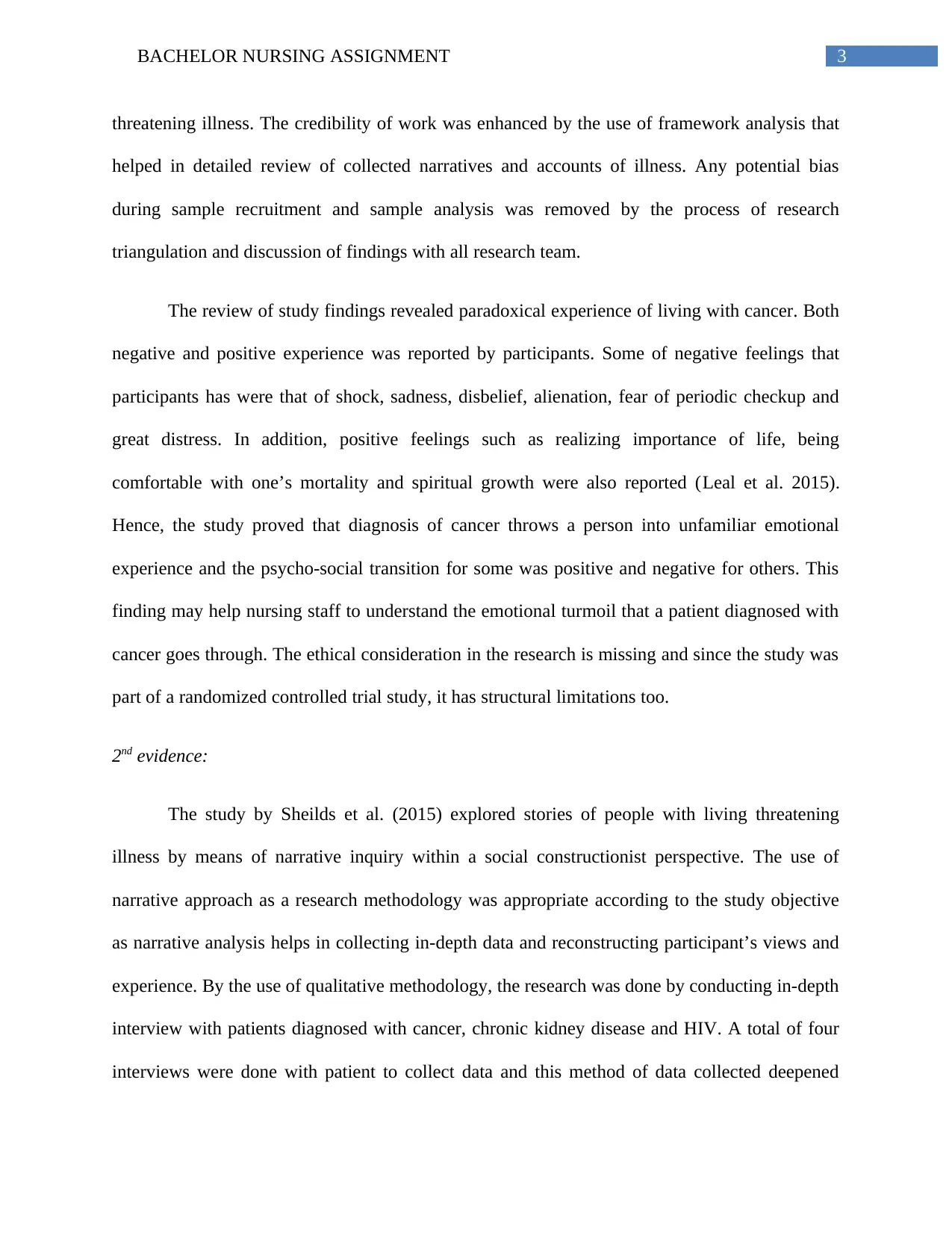
3BACHELOR NURSING ASSIGNMENT
threatening illness. The credibility of work was enhanced by the use of framework analysis that
helped in detailed review of collected narratives and accounts of illness. Any potential bias
during sample recruitment and sample analysis was removed by the process of research
triangulation and discussion of findings with all research team.
The review of study findings revealed paradoxical experience of living with cancer. Both
negative and positive experience was reported by participants. Some of negative feelings that
participants has were that of shock, sadness, disbelief, alienation, fear of periodic checkup and
great distress. In addition, positive feelings such as realizing importance of life, being
comfortable with one’s mortality and spiritual growth were also reported (Leal et al. 2015).
Hence, the study proved that diagnosis of cancer throws a person into unfamiliar emotional
experience and the psycho-social transition for some was positive and negative for others. This
finding may help nursing staff to understand the emotional turmoil that a patient diagnosed with
cancer goes through. The ethical consideration in the research is missing and since the study was
part of a randomized controlled trial study, it has structural limitations too.
2nd evidence:
The study by Sheilds et al. (2015) explored stories of people with living threatening
illness by means of narrative inquiry within a social constructionist perspective. The use of
narrative approach as a research methodology was appropriate according to the study objective
as narrative analysis helps in collecting in-depth data and reconstructing participant’s views and
experience. By the use of qualitative methodology, the research was done by conducting in-depth
interview with patients diagnosed with cancer, chronic kidney disease and HIV. A total of four
interviews were done with patient to collect data and this method of data collected deepened
threatening illness. The credibility of work was enhanced by the use of framework analysis that
helped in detailed review of collected narratives and accounts of illness. Any potential bias
during sample recruitment and sample analysis was removed by the process of research
triangulation and discussion of findings with all research team.
The review of study findings revealed paradoxical experience of living with cancer. Both
negative and positive experience was reported by participants. Some of negative feelings that
participants has were that of shock, sadness, disbelief, alienation, fear of periodic checkup and
great distress. In addition, positive feelings such as realizing importance of life, being
comfortable with one’s mortality and spiritual growth were also reported (Leal et al. 2015).
Hence, the study proved that diagnosis of cancer throws a person into unfamiliar emotional
experience and the psycho-social transition for some was positive and negative for others. This
finding may help nursing staff to understand the emotional turmoil that a patient diagnosed with
cancer goes through. The ethical consideration in the research is missing and since the study was
part of a randomized controlled trial study, it has structural limitations too.
2nd evidence:
The study by Sheilds et al. (2015) explored stories of people with living threatening
illness by means of narrative inquiry within a social constructionist perspective. The use of
narrative approach as a research methodology was appropriate according to the study objective
as narrative analysis helps in collecting in-depth data and reconstructing participant’s views and
experience. By the use of qualitative methodology, the research was done by conducting in-depth
interview with patients diagnosed with cancer, chronic kidney disease and HIV. A total of four
interviews were done with patient to collect data and this method of data collected deepened
Paraphrase This Document
Need a fresh take? Get an instant paraphrase of this document with our AI Paraphraser
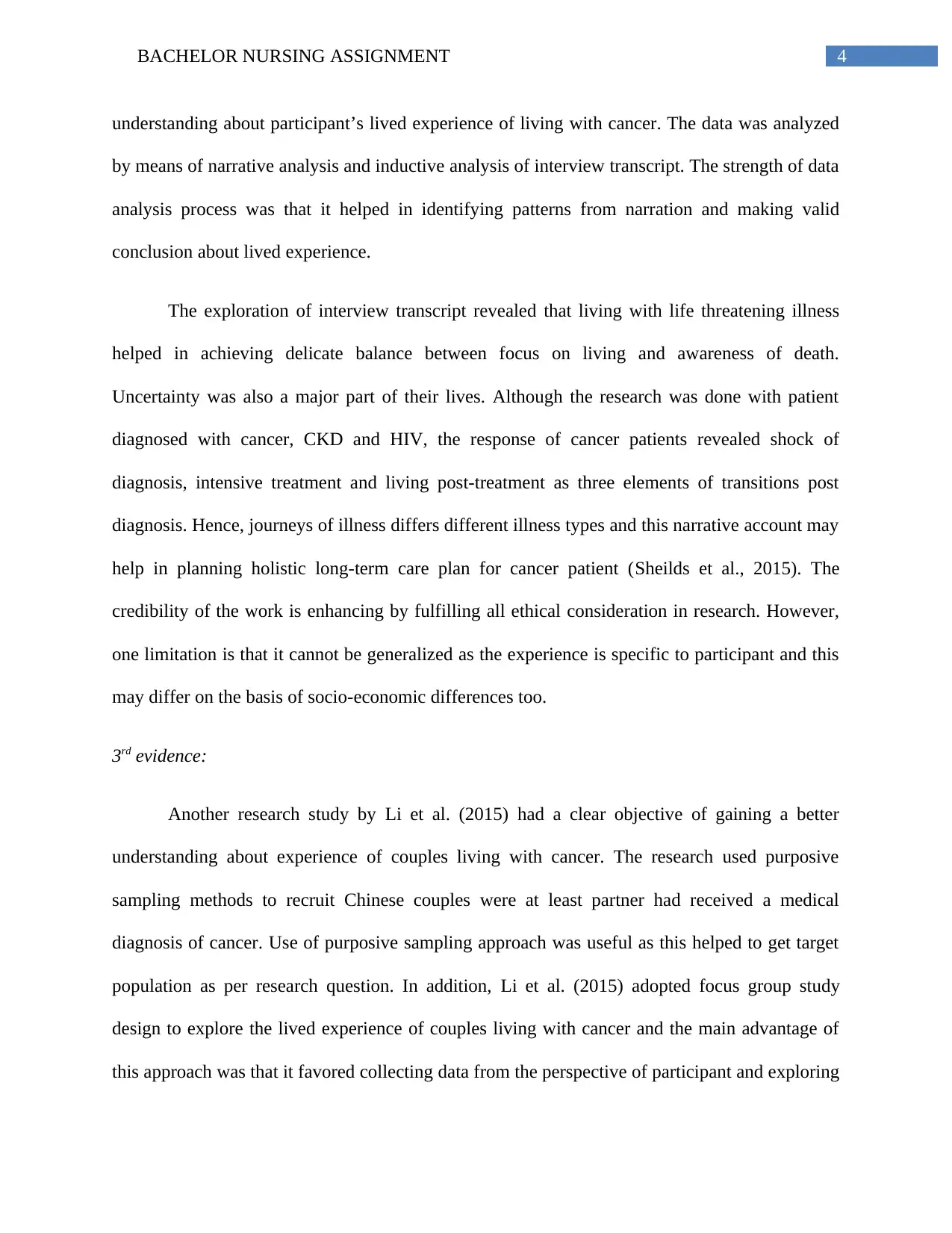
4BACHELOR NURSING ASSIGNMENT
understanding about participant’s lived experience of living with cancer. The data was analyzed
by means of narrative analysis and inductive analysis of interview transcript. The strength of data
analysis process was that it helped in identifying patterns from narration and making valid
conclusion about lived experience.
The exploration of interview transcript revealed that living with life threatening illness
helped in achieving delicate balance between focus on living and awareness of death.
Uncertainty was also a major part of their lives. Although the research was done with patient
diagnosed with cancer, CKD and HIV, the response of cancer patients revealed shock of
diagnosis, intensive treatment and living post-treatment as three elements of transitions post
diagnosis. Hence, journeys of illness differs different illness types and this narrative account may
help in planning holistic long-term care plan for cancer patient (Sheilds et al., 2015). The
credibility of the work is enhancing by fulfilling all ethical consideration in research. However,
one limitation is that it cannot be generalized as the experience is specific to participant and this
may differ on the basis of socio-economic differences too.
3rd evidence:
Another research study by Li et al. (2015) had a clear objective of gaining a better
understanding about experience of couples living with cancer. The research used purposive
sampling methods to recruit Chinese couples were at least partner had received a medical
diagnosis of cancer. Use of purposive sampling approach was useful as this helped to get target
population as per research question. In addition, Li et al. (2015) adopted focus group study
design to explore the lived experience of couples living with cancer and the main advantage of
this approach was that it favored collecting data from the perspective of participant and exploring
understanding about participant’s lived experience of living with cancer. The data was analyzed
by means of narrative analysis and inductive analysis of interview transcript. The strength of data
analysis process was that it helped in identifying patterns from narration and making valid
conclusion about lived experience.
The exploration of interview transcript revealed that living with life threatening illness
helped in achieving delicate balance between focus on living and awareness of death.
Uncertainty was also a major part of their lives. Although the research was done with patient
diagnosed with cancer, CKD and HIV, the response of cancer patients revealed shock of
diagnosis, intensive treatment and living post-treatment as three elements of transitions post
diagnosis. Hence, journeys of illness differs different illness types and this narrative account may
help in planning holistic long-term care plan for cancer patient (Sheilds et al., 2015). The
credibility of the work is enhancing by fulfilling all ethical consideration in research. However,
one limitation is that it cannot be generalized as the experience is specific to participant and this
may differ on the basis of socio-economic differences too.
3rd evidence:
Another research study by Li et al. (2015) had a clear objective of gaining a better
understanding about experience of couples living with cancer. The research used purposive
sampling methods to recruit Chinese couples were at least partner had received a medical
diagnosis of cancer. Use of purposive sampling approach was useful as this helped to get target
population as per research question. In addition, Li et al. (2015) adopted focus group study
design to explore the lived experience of couples living with cancer and the main advantage of
this approach was that it favored collecting data from the perspective of participant and exploring
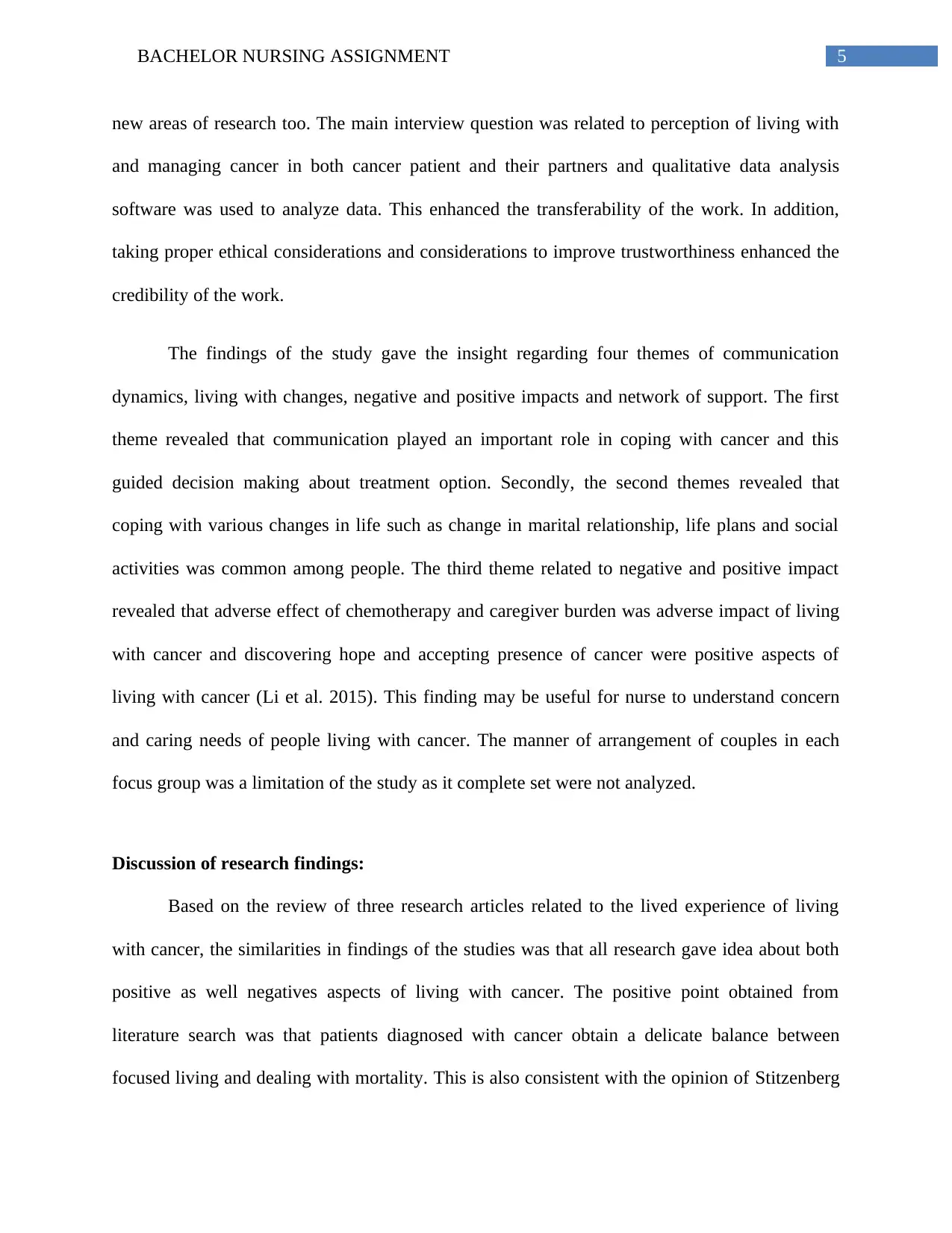
5BACHELOR NURSING ASSIGNMENT
new areas of research too. The main interview question was related to perception of living with
and managing cancer in both cancer patient and their partners and qualitative data analysis
software was used to analyze data. This enhanced the transferability of the work. In addition,
taking proper ethical considerations and considerations to improve trustworthiness enhanced the
credibility of the work.
The findings of the study gave the insight regarding four themes of communication
dynamics, living with changes, negative and positive impacts and network of support. The first
theme revealed that communication played an important role in coping with cancer and this
guided decision making about treatment option. Secondly, the second themes revealed that
coping with various changes in life such as change in marital relationship, life plans and social
activities was common among people. The third theme related to negative and positive impact
revealed that adverse effect of chemotherapy and caregiver burden was adverse impact of living
with cancer and discovering hope and accepting presence of cancer were positive aspects of
living with cancer (Li et al. 2015). This finding may be useful for nurse to understand concern
and caring needs of people living with cancer. The manner of arrangement of couples in each
focus group was a limitation of the study as it complete set were not analyzed.
Discussion of research findings:
Based on the review of three research articles related to the lived experience of living
with cancer, the similarities in findings of the studies was that all research gave idea about both
positive as well negatives aspects of living with cancer. The positive point obtained from
literature search was that patients diagnosed with cancer obtain a delicate balance between
focused living and dealing with mortality. This is also consistent with the opinion of Stitzenberg
new areas of research too. The main interview question was related to perception of living with
and managing cancer in both cancer patient and their partners and qualitative data analysis
software was used to analyze data. This enhanced the transferability of the work. In addition,
taking proper ethical considerations and considerations to improve trustworthiness enhanced the
credibility of the work.
The findings of the study gave the insight regarding four themes of communication
dynamics, living with changes, negative and positive impacts and network of support. The first
theme revealed that communication played an important role in coping with cancer and this
guided decision making about treatment option. Secondly, the second themes revealed that
coping with various changes in life such as change in marital relationship, life plans and social
activities was common among people. The third theme related to negative and positive impact
revealed that adverse effect of chemotherapy and caregiver burden was adverse impact of living
with cancer and discovering hope and accepting presence of cancer were positive aspects of
living with cancer (Li et al. 2015). This finding may be useful for nurse to understand concern
and caring needs of people living with cancer. The manner of arrangement of couples in each
focus group was a limitation of the study as it complete set were not analyzed.
Discussion of research findings:
Based on the review of three research articles related to the lived experience of living
with cancer, the similarities in findings of the studies was that all research gave idea about both
positive as well negatives aspects of living with cancer. The positive point obtained from
literature search was that patients diagnosed with cancer obtain a delicate balance between
focused living and dealing with mortality. This is also consistent with the opinion of Stitzenberg
⊘ This is a preview!⊘
Do you want full access?
Subscribe today to unlock all pages.

Trusted by 1+ million students worldwide
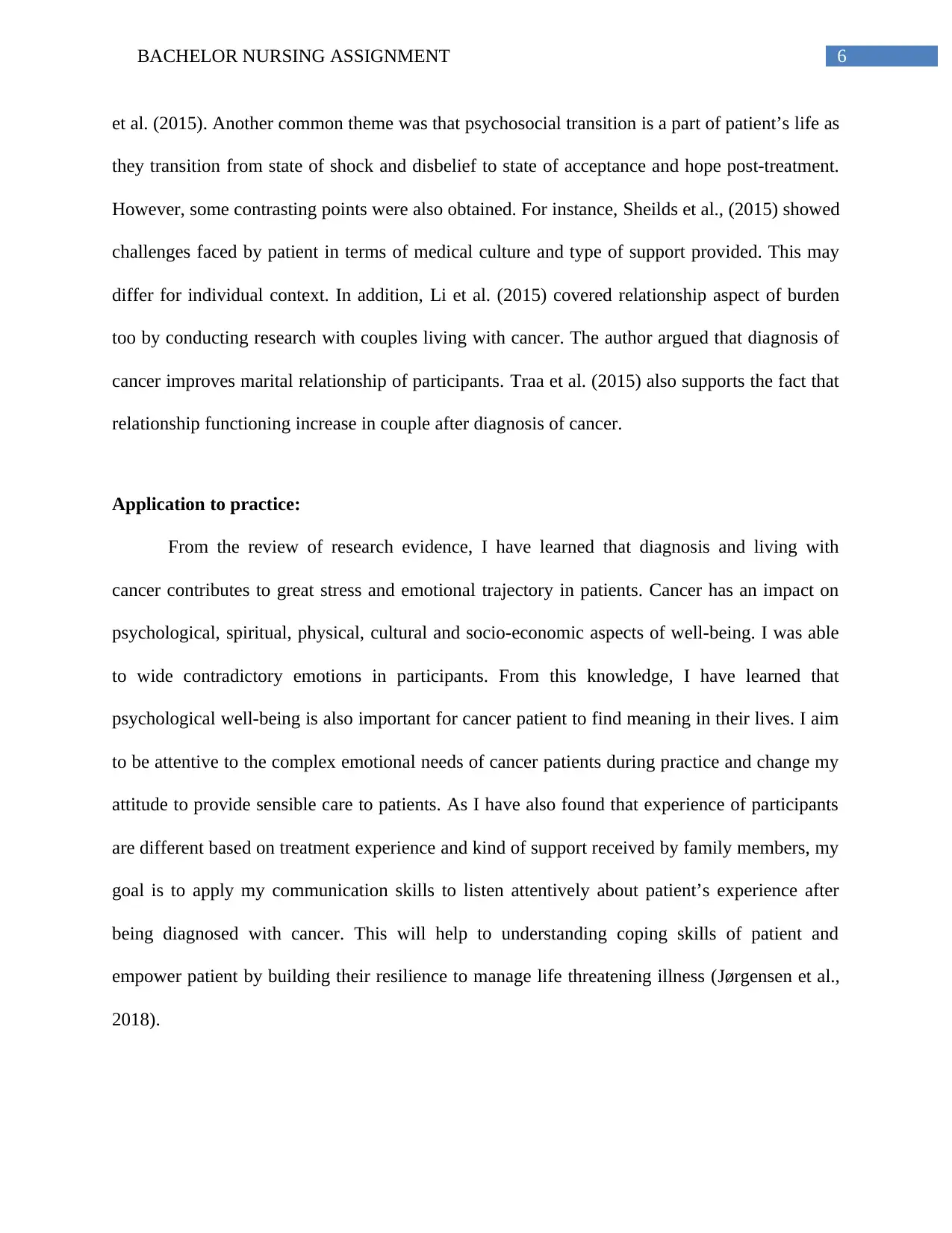
6BACHELOR NURSING ASSIGNMENT
et al. (2015). Another common theme was that psychosocial transition is a part of patient’s life as
they transition from state of shock and disbelief to state of acceptance and hope post-treatment.
However, some contrasting points were also obtained. For instance, Sheilds et al., (2015) showed
challenges faced by patient in terms of medical culture and type of support provided. This may
differ for individual context. In addition, Li et al. (2015) covered relationship aspect of burden
too by conducting research with couples living with cancer. The author argued that diagnosis of
cancer improves marital relationship of participants. Traa et al. (2015) also supports the fact that
relationship functioning increase in couple after diagnosis of cancer.
Application to practice:
From the review of research evidence, I have learned that diagnosis and living with
cancer contributes to great stress and emotional trajectory in patients. Cancer has an impact on
psychological, spiritual, physical, cultural and socio-economic aspects of well-being. I was able
to wide contradictory emotions in participants. From this knowledge, I have learned that
psychological well-being is also important for cancer patient to find meaning in their lives. I aim
to be attentive to the complex emotional needs of cancer patients during practice and change my
attitude to provide sensible care to patients. As I have also found that experience of participants
are different based on treatment experience and kind of support received by family members, my
goal is to apply my communication skills to listen attentively about patient’s experience after
being diagnosed with cancer. This will help to understanding coping skills of patient and
empower patient by building their resilience to manage life threatening illness (Jørgensen et al.,
2018).
et al. (2015). Another common theme was that psychosocial transition is a part of patient’s life as
they transition from state of shock and disbelief to state of acceptance and hope post-treatment.
However, some contrasting points were also obtained. For instance, Sheilds et al., (2015) showed
challenges faced by patient in terms of medical culture and type of support provided. This may
differ for individual context. In addition, Li et al. (2015) covered relationship aspect of burden
too by conducting research with couples living with cancer. The author argued that diagnosis of
cancer improves marital relationship of participants. Traa et al. (2015) also supports the fact that
relationship functioning increase in couple after diagnosis of cancer.
Application to practice:
From the review of research evidence, I have learned that diagnosis and living with
cancer contributes to great stress and emotional trajectory in patients. Cancer has an impact on
psychological, spiritual, physical, cultural and socio-economic aspects of well-being. I was able
to wide contradictory emotions in participants. From this knowledge, I have learned that
psychological well-being is also important for cancer patient to find meaning in their lives. I aim
to be attentive to the complex emotional needs of cancer patients during practice and change my
attitude to provide sensible care to patients. As I have also found that experience of participants
are different based on treatment experience and kind of support received by family members, my
goal is to apply my communication skills to listen attentively about patient’s experience after
being diagnosed with cancer. This will help to understanding coping skills of patient and
empower patient by building their resilience to manage life threatening illness (Jørgensen et al.,
2018).
Paraphrase This Document
Need a fresh take? Get an instant paraphrase of this document with our AI Paraphraser
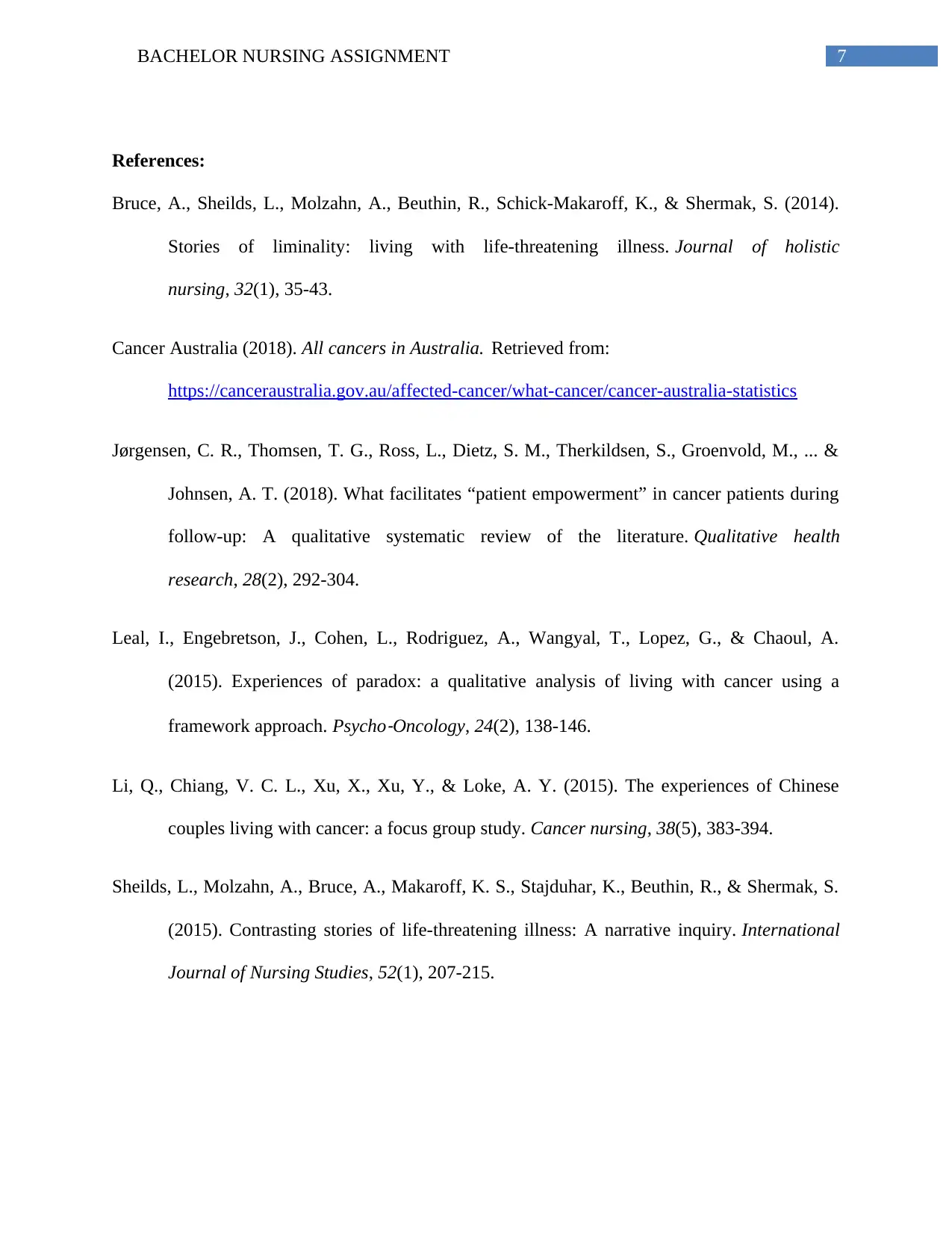
7BACHELOR NURSING ASSIGNMENT
References:
Bruce, A., Sheilds, L., Molzahn, A., Beuthin, R., Schick-Makaroff, K., & Shermak, S. (2014).
Stories of liminality: living with life-threatening illness. Journal of holistic
nursing, 32(1), 35-43.
Cancer Australia (2018). All cancers in Australia. Retrieved from:
https://canceraustralia.gov.au/affected-cancer/what-cancer/cancer-australia-statistics
Jørgensen, C. R., Thomsen, T. G., Ross, L., Dietz, S. M., Therkildsen, S., Groenvold, M., ... &
Johnsen, A. T. (2018). What facilitates “patient empowerment” in cancer patients during
follow-up: A qualitative systematic review of the literature. Qualitative health
research, 28(2), 292-304.
Leal, I., Engebretson, J., Cohen, L., Rodriguez, A., Wangyal, T., Lopez, G., & Chaoul, A.
(2015). Experiences of paradox: a qualitative analysis of living with cancer using a
framework approach. Psycho
‐Oncology, 24(2), 138-146.
Li, Q., Chiang, V. C. L., Xu, X., Xu, Y., & Loke, A. Y. (2015). The experiences of Chinese
couples living with cancer: a focus group study. Cancer nursing, 38(5), 383-394.
Sheilds, L., Molzahn, A., Bruce, A., Makaroff, K. S., Stajduhar, K., Beuthin, R., & Shermak, S.
(2015). Contrasting stories of life-threatening illness: A narrative inquiry. International
Journal of Nursing Studies, 52(1), 207-215.
References:
Bruce, A., Sheilds, L., Molzahn, A., Beuthin, R., Schick-Makaroff, K., & Shermak, S. (2014).
Stories of liminality: living with life-threatening illness. Journal of holistic
nursing, 32(1), 35-43.
Cancer Australia (2018). All cancers in Australia. Retrieved from:
https://canceraustralia.gov.au/affected-cancer/what-cancer/cancer-australia-statistics
Jørgensen, C. R., Thomsen, T. G., Ross, L., Dietz, S. M., Therkildsen, S., Groenvold, M., ... &
Johnsen, A. T. (2018). What facilitates “patient empowerment” in cancer patients during
follow-up: A qualitative systematic review of the literature. Qualitative health
research, 28(2), 292-304.
Leal, I., Engebretson, J., Cohen, L., Rodriguez, A., Wangyal, T., Lopez, G., & Chaoul, A.
(2015). Experiences of paradox: a qualitative analysis of living with cancer using a
framework approach. Psycho
‐Oncology, 24(2), 138-146.
Li, Q., Chiang, V. C. L., Xu, X., Xu, Y., & Loke, A. Y. (2015). The experiences of Chinese
couples living with cancer: a focus group study. Cancer nursing, 38(5), 383-394.
Sheilds, L., Molzahn, A., Bruce, A., Makaroff, K. S., Stajduhar, K., Beuthin, R., & Shermak, S.
(2015). Contrasting stories of life-threatening illness: A narrative inquiry. International
Journal of Nursing Studies, 52(1), 207-215.
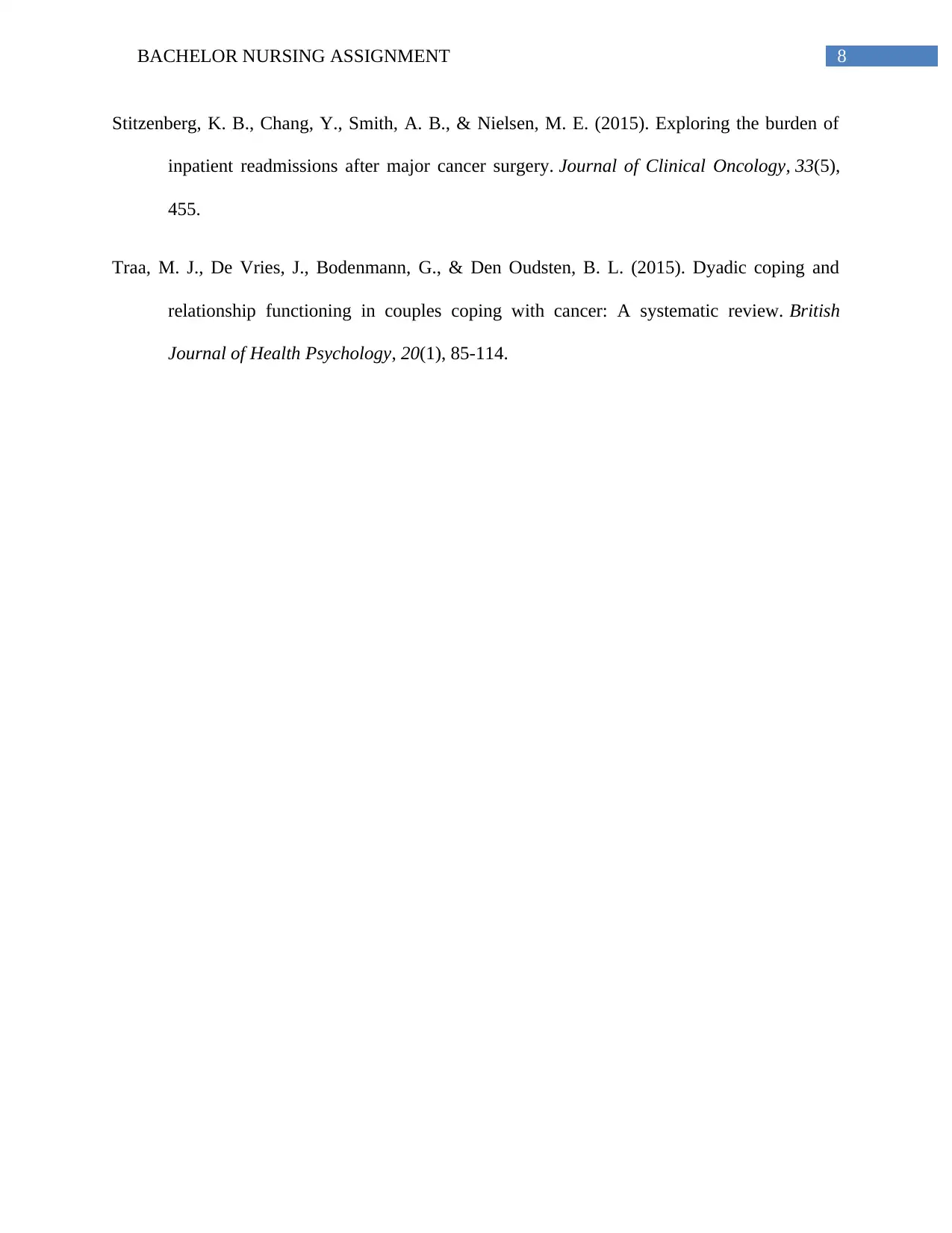
8BACHELOR NURSING ASSIGNMENT
Stitzenberg, K. B., Chang, Y., Smith, A. B., & Nielsen, M. E. (2015). Exploring the burden of
inpatient readmissions after major cancer surgery. Journal of Clinical Oncology, 33(5),
455.
Traa, M. J., De Vries, J., Bodenmann, G., & Den Oudsten, B. L. (2015). Dyadic coping and
relationship functioning in couples coping with cancer: A systematic review. British
Journal of Health Psychology, 20(1), 85-114.
Stitzenberg, K. B., Chang, Y., Smith, A. B., & Nielsen, M. E. (2015). Exploring the burden of
inpatient readmissions after major cancer surgery. Journal of Clinical Oncology, 33(5),
455.
Traa, M. J., De Vries, J., Bodenmann, G., & Den Oudsten, B. L. (2015). Dyadic coping and
relationship functioning in couples coping with cancer: A systematic review. British
Journal of Health Psychology, 20(1), 85-114.
⊘ This is a preview!⊘
Do you want full access?
Subscribe today to unlock all pages.

Trusted by 1+ million students worldwide
1 out of 9
Related Documents
Your All-in-One AI-Powered Toolkit for Academic Success.
+13062052269
info@desklib.com
Available 24*7 on WhatsApp / Email
![[object Object]](/_next/static/media/star-bottom.7253800d.svg)
Unlock your academic potential
Copyright © 2020–2026 A2Z Services. All Rights Reserved. Developed and managed by ZUCOL.





